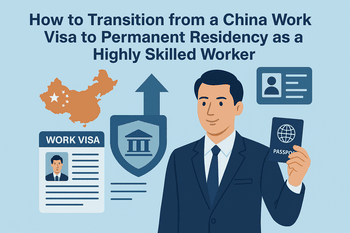
Navigating the transition from a standard China work visa to obtaining permanent residency can be both a challenge and an opportunity, especially if you’re a highly skilled professional looking to make long-term plans in one of the world’s most dynamic economies.
This guide delves into the process, outlines essential steps, and provides practical tips to help you achieve permanent residency status seamlessly.
Whether you’re already experienced in China’s work visa system or just starting out, understanding the entire pathway is vital for a smooth transition.
Understanding China’s Visa Landscape
Before diving into the intricacies of the permanent residency application, it is important to grasp the differences between a work visa and a permanent residency permit.
The work visa (commonly known as the Z visa) is a temporary entry document that allows you to work legally in China. On the other hand, permanent residency—or the “China Green Card”—grants you long-term residence rights, enabling you to live and work without the need for continuous visa renewals.
As a highly skilled worker, your professional contributions and your value to China’s economy play a significant role in easing this transition.
Steps to Transition from a Work Visa to Permanent Residency
The journey from a work visa to permanent residency involves multiple steps and meticulous planning.
Below is an outline of the key stages in the process:
1. Evaluate Your Eligibility
Eligibility criteria can be stricter for permanent residency compared to a standard visa.
Generally, as a highly skilled worker, factors such as educational background, professional achievements, industry demand, and contributions to China’s economic development are taken into account.
In cities like Beijing and Shanghai, the list of qualifying criteria might include holding a “talent” designation on your work permit or meeting a specified income threshold.
Check specific guidelines on government websites such as the Beijing Municipal Government Permanent Residency page for city-specific insights.
2. Secure Employer Support
A strong endorsement from your employer can make a substantial difference.
Not only does the company support your application by validating your work record and contributions, but they may also be able to streamline parts of the process, especially if they are conversant with the local requirements.
Collaborate closely with your HR department to gather supporting documents such as employment contracts, tax records, and performance reviews.
3. Assemble the Required Documentation
The documentation for a permanent residency application is extensive.
Common documents include:
- Valid Passport and Current Work Visa: Proof of legal residency.
- Employment Records and Contracts: Verifying your employment status.
- Tax Clearance Documents: Demonstrating compliance with local tax laws.
- Academic and Professional Qualifications: Degrees, certifications, and proof of any outstanding contributions.
- Health Certificates and Police Clearance: Ensuring you meet health and legal standards.
It is wise to prepare copies in both Chinese and your native language when required.
Double-check the institution-specific requirements before submission.
4. Complete the Formal Application Process
The application process itself involves several bureaucratic stages:
- Submission of Application: File your application with local authorities.
- Review by Local Authorities: Your documents and qualifications are scrutinized to ensure you meet the necessary criteria.
- Approval by the Ministry of Public Security: For final confirmation, your case will be forwarded to the highest level of scrutiny.
Due to multiple levels of review, patience is essential.
This multi-step process is designed to ensure that only highly qualified candidates receive permanent residency status.
5. Prepare for an Interview
In many cases, an interview with immigration or public security officials is required.
This step is your chance to present your career achievements and future plans in China clearly.
Practice answers to likely questions and be prepared to discuss your long-term commitments to living and working in China.
A Detailed Roadmap
Below is a table that outlines the essential steps, associated documents or activities, and an estimated timeline for each stage of the process.
This table is designed to serve as a checklist that you can tailor to your personal circumstances:
| Stage | Key Activities/Requirements | Estimated Time |
|---|---|---|
| Eligibility Assessment | Review criteria, check with local regulations (city-specific guidelines apply). | 1-2 months |
| Employer Endorsement | Obtain supporting documentation from employer, prepare endorsement letters, and verify work history. | 1-2 months |
| Documentation Gathering | Collect passports, work visa, contracts, tax clearances, academic and professional certificates, health & police records. | 2-3 months |
| Application Submission | Submit application to local immigration office with complete documents. | 1 month |
| Review Process | Local government review, interviews, and additional requests for information. | 3-6 months |
| Final Approval | Ministry of Public Security finalizes the decision and issues the permanent residency certificate. | 1-2 months |
Note: Processing times may vary based on the local jurisdiction and complexity of your application.
Key Considerations and Tips for a Successful Transition
Transitioning from a China work visa to permanent residency involves more than just submitting paperwork.
Here are some insider tips that can enhance your application:
Build a Strong Professional Profile
Your work accomplishments and contributions are at the center of the evaluation process.
Engage in projects that highlight your unique skill set and maintain robust professional networks within China.
If possible, consider publishing academic papers, contributing to industry research, or participating in panels and conferences.
Maintain Perfect Tax Records
Regularly update your tax filings and ensure that all payments are documented accurately.
Any discrepancies in your tax history can become a hindrance during the evaluation process.
Use reputable accounting services if needed to maintain clarity in your records.
Understand Regional Differences
China’s immigration policies can vary by city. For instance, Beijing might have a different set of criteria compared to cities like Shanghai or Shenzhen.
It is advisable to consult local chambers of commerce or legal experts who specialize in immigration matters.
Websites like ExpatDen’s guide to China Permanent Residence provide detailed insight and comparisons for various regions.
Plan Financially
Some parts of the process may require investment, both in terms of application fees and if you need to upgrade your documentation services (translations, notarizations, etc.).
Set aside funds specifically for this transition, and maybe even consult with a financial advisor who understands expatriate finances in China.
Stay Informed and Updated
Immigration policies are subject to change, and staying updated on any changes to China’s residency requirements is essential.
Follow official government channels, subscribe to newsletters, or join expat communities online.
Leveraging multiple sources of information ensures you are prepared for any policy shift during your application period.
Frequently Asked Questions
Q: How do I know if I qualify as a highly skilled worker?
A: Qualifying criteria typically include advanced degrees, specific technical certifications, extensive work experience, and a high level of professional expertise that is in demand in China. Each city may have further specifications—for instance, Beijing’s guidelines include criteria on salary thresholds and contributions to innovative projects.
Q: Can my employer influence the outcome of my application?
A: Yes, employer endorsement and support can significantly streamline your application process. Providing additional documentation and verification of your contribution to the company reinforces the positive evaluation of your candidacy.
Q: Is the process similar across major Chinese cities?
A: While the overarching process remains similar, individual cities have nuanced requirements, timelines, and documentation checklists. Always refer to the specific requirements of the region where you intend to apply.
Q: What common pitfalls should I avoid?
A: Ensure you do not miss any documents, always double-check translation requirements, and avoid any shortcuts during the interview process. Consistency and thoroughness are the keys to success.
Final Thoughts
Transitioning from a temporary work visa to permanent residency in China as a highly skilled worker is undoubtedly challenging but also exceedingly rewarding.
It underscores your commitment to building a lasting career in China and contributing to the nation’s growth.
With careful planning, proper documentation, and the right support network, you can navigate the complex process with confidence.
Ultimately, your perseverance and professional excellence will shine through, paving the way for a brighter future in one of the world’s fastest-growing regions.
For more detailed information and updates, refer to official sources such as the Beijing Permanent Residency Guidelines and guides like ExpatDen’s China Permanent Residence.



